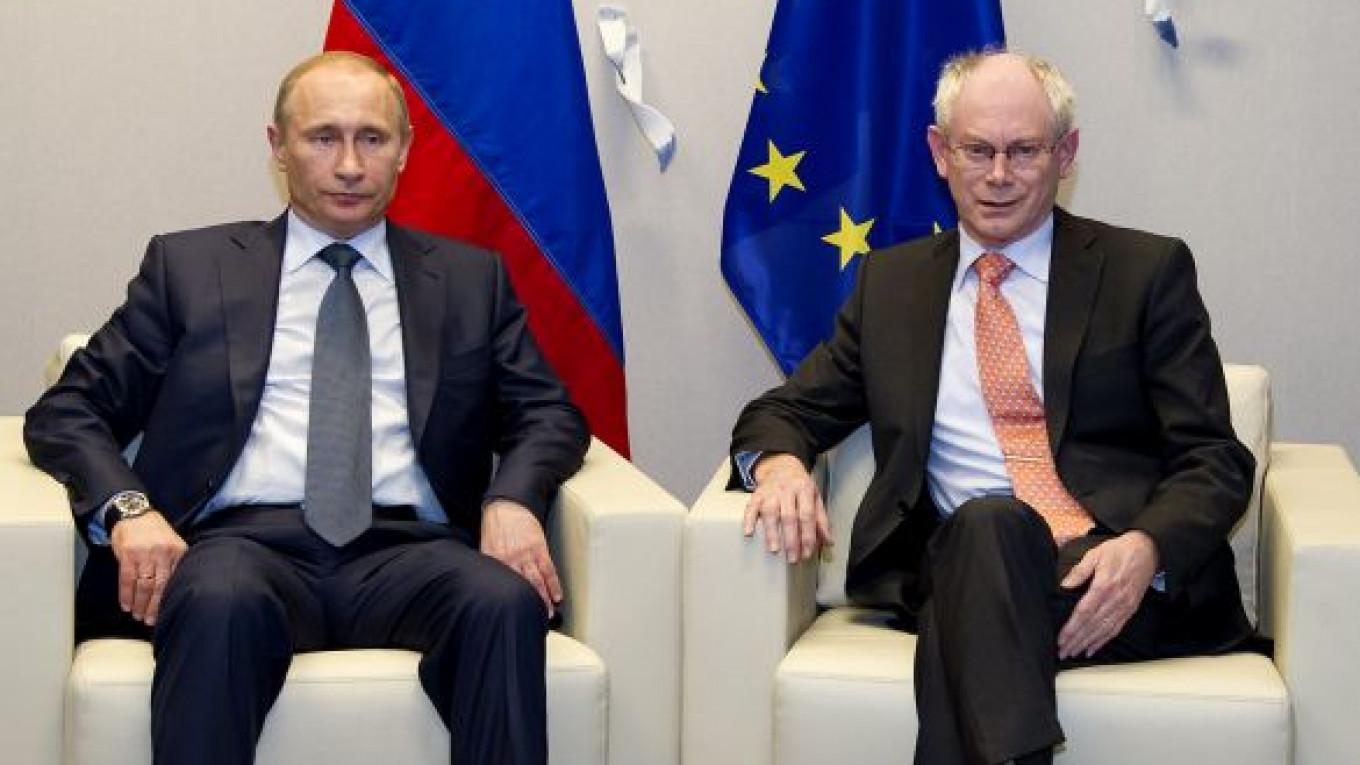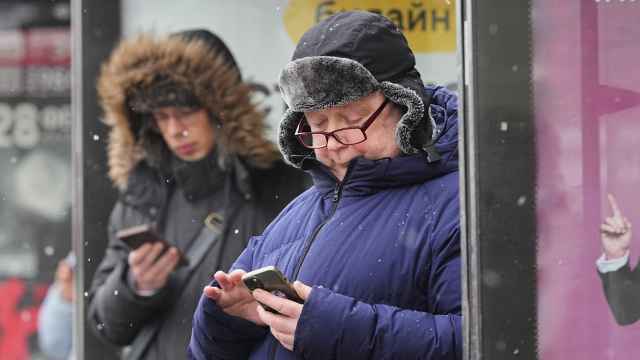President Vladimir Putin will meet with European Union leaders in Brussels on Friday for a pre-Christmas summit, but the mood will hardly be festive.
Disputes involving visas, trade and energy have cast a shadow over EU-Russia relations in recent months, giving both sides tough issues to discuss. More broadly, the Europeans are expected to voice concern about the Kremlin's crackdown on dissent, while Moscow's stance toward Europe is cooling following its recent foreign-policy emphasis on Eurasia.
"I have no high expectations of this summit," said George SchЪpflin, a member of the European Parliament from Hungary's conservative Fidesz party.
Schopflin said feelings among Brussels officials toward Moscow had definitely cooled over the past months.
"There is considerable unease about human rights," he said by telephone.
In a highly critical motion passed last week, the European Parliament demanded that Russia end "politically motivated persecutions, arrests and detentions" among opposition members.
The resolution also cites an October motion in which deputies called for sanctions against human rights violators analogous to the U.S. Magnitsky Act, and it calls for the immediate release of members of the Pussy Riot punk band.
Elmar Brok, the head of the European Parliament's foreign relations committee, said after talks with Duma deputies in Moscow on Wednesday that the resolution could be used to slap visa bans on Russian officials implicated in human rights violations, Interfax reported.
Brok told the Moscow Times he thinks Russian lawmakers suffer from paranoia. "They talk more about Pussy Riot than we do," he said.
He added that EU leaders should appear united at the summit.
"I hope that no selfish interests will interfere," he said.
Moscow's EU ambassador, Vladimir Chizhov, has said that human rights issues should not be raised at the summit. Speaking to reporters in Brussels earlier this week, Chizhov said it was better to leave that issue to specialist institutions like the EU's new human rights representative, Stavros Lambrinidis, Interfax reported.
However, it is unlikely that EU President Herman van Rompuy and commission Chairman Manuel Barroso will heed this advice. Rights groups have called on them to raise the issue forcefully.
"The EU should convey a clear sense of alarm at the crackdown of the past six months on Russia's vibrant civil society," Human Rights Watch said in a statement this week.
Even without human rights, the atmosphere promises to be difficult, given the host of disagreements between both sides.
Moscow has been furious with the EU commission's decision to investigate allegations that Gazprom abused its dominant position in eastern European gas markets. The government has also criticized the EU's so-called third energy package, a set of regulations seeking to liberalize gas markets by forcing companies to split production and retail operations from their transmission networks.
The EU is Russia's biggest trading partner and a major buyer of its energy. Russia buys mainly cars and consumer goods from its western neighbors, including 10 percent of EU farm exports.
While Russia joined the World Trade Organization this year, EU officials have criticized Moscow's latest decisions to slap a recycling fee on imported cars and bans on live animals as counter to the organization's rules.
Maxim Medvedkov, Moscow's point man on the WTO, has retorted that the EU is violating WTO rules with its third energy package, anti-dumping measures and restrictions on the transit of Russian goods.
Finally, visa issues loom large on the agenda, but nobody expects any breakthrough Friday.
While talks on have not been suspended, no talks have been held since fall 2011.
It is more likely that Putin will focus on separate talks on abolishing visas altogether and reiterate Moscow's demands that visa-free travel be implemented before the Sochi Winter Olympics in February 2014.
However, Europeans have been adamant in rejecting "artificial time frames," insisting that a "common steps" program that is currently being implemented between both sides does not include a deadline.
Related articles:
A Message from The Moscow Times:
Dear readers,
We are facing unprecedented challenges. Russia's Prosecutor General's Office has designated The Moscow Times as an "undesirable" organization, criminalizing our work and putting our staff at risk of prosecution. This follows our earlier unjust labeling as a "foreign agent."
These actions are direct attempts to silence independent journalism in Russia. The authorities claim our work "discredits the decisions of the Russian leadership." We see things differently: we strive to provide accurate, unbiased reporting on Russia.
We, the journalists of The Moscow Times, refuse to be silenced. But to continue our work, we need your help.
Your support, no matter how small, makes a world of difference. If you can, please support us monthly starting from just $2. It's quick to set up, and every contribution makes a significant impact.
By supporting The Moscow Times, you're defending open, independent journalism in the face of repression. Thank you for standing with us.
Remind me later.







